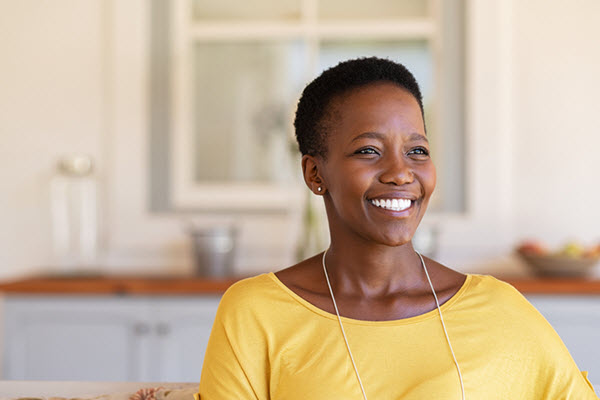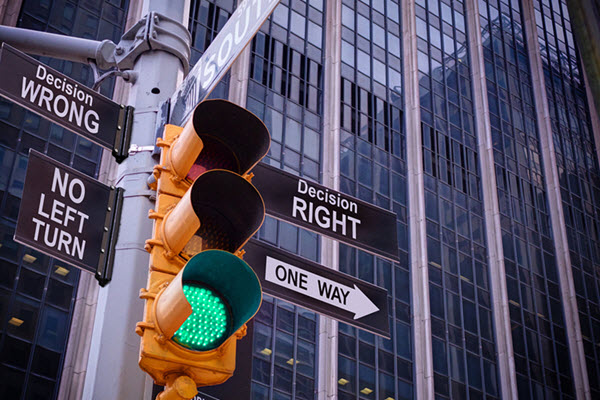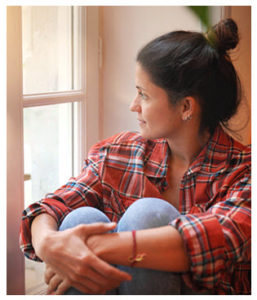When you’re making a decision, which do you rely on most — fact or feeling? If the two don’t align, which way do you lean?

When the good-looking stranger catches your eye and then flashes a grin, do you look away or do you engage? Do you return the smile?
In a new relationship, if you hear rumors about your latest “object of desire,” rumors that are concerning even if only on social media, then what? Do you dismiss them or do you take them in, doing a bit of checking on your own and proceeding with caution?
Believing What We “Want” to Believe
Do you believe what you want to believe rather than contradictory facts as presented to you? When making a judgment call, do you seek out and then consider the information that affects your decision-making or do you go with your feelings, your impressions, your fancy (as others may call it)? Do you go with your gut?
I know, I know. Entire books could be (and no doubt, are) written on this subject. I’m simply curious to understand in what circumstances others make decisions when gut and reason are not in sync. Yes, I’m facing some decisions of my own, nothing earth-shattering, mind you, but that leads me to wonder about the way others make key choices particularly when what you “feel like” doing is in opposition to all of the clear, tangible, provable, fact-based elements that are telling you “this way, not that way.”
How do you refashion a tendency to go with what you want to believe over what you ought to believe?
Ah, Yes. Hindsight. Illuminating AND Irritating.
Hindsight is 2020 of course, and as the years go on we may have the experience of trusting our judgment and gut — or not. Equally true: However we make decisions, we don’t control everything! And beating ourselves up for less than desirable outcomes too often ignores this last point, a subject that came up in conversation with an old friend recently as she was berating herself for choices in the past, particularly in relationships, that ended badly.
Sure, her actions were critical to how these relationships played out. But hindsight also revealed factors she could never have managed even if she had been aware of them at the time, which she wasn’t — through no fault of her own, I might add. Consequently, her self-flagellation served no purpose. If anything, it was an obstacle to learning important lessons that hindsight provides. Well, that hindsight provides if you’re willing to give it a chance to nudge you in a healthier direction in the future…
Other situations that come to mind?
How about some of the most major events that any of us can undertake or participate in — falling in love, marriage, divorce, having children or not, where we move, the job path we choose to take, the doctors we listen to, the friends we listen to, the passions we pursue, and so on. The first time we make these choices we don’t have the benefit of hindsight. But as we make these or similar choices with personal knowledge? Exactly. Hindsight is helpful. We should take it into consideration.
So When Is Going With Your Gut OK?
Big changes. Small changes. Big decisions. Small decisions. So when is it ok to go with your gut? When is it ok for me to go with my gut? Have I learned from past experience or am I still making the same (big and small) mistakes?
What about you? What have you learned from your successes and failures in decision-making? I’m especially curious about those who are on the precipice of making a change — downsizing and relocating to a new apartment, a new town, a new country; taking a chance on a new career in an unexpected field; making a major decision about a spouse or partner. How do you decide what’s next? Do you wait for a spark, a sign, a serendipitous moment of apparent affirmation or whimsy (to others?) to nudge yourself toward a new path? Do you put yourself in situations to encourage faith in your gut feelings? Must some choices rely on some sort of spark followed by “reasoned” justifications for the feelings?

When it comes to important decisions, most of us understand the complexity of the factors and the absence of guarantees. Still, decision-making styles are fascinating, don’t you think?
Perhaps you are all about facts over feelings. If so, do you make lists of pros and cons, realistic assessments of opportunities and constraints? Do you assign probabilities of success (however you measure it), do your research, and consult others whose advice and counsel you respect? Do you seek out others who have been faced with similar decisions, others who have stood at the same crossroads wondering which direction to take? Do you listen attentively to the retelling of their stories, their processes, their outcomes?
My “Big” Choices
My decision-making style? Setting aside professional decision-making (since I’m primarily musing on personal decisions), I admit to having gone with my gut at times and with entirely rational elements of assessing risk and reward at others. My marriage is an example of the former (yes, I’m divorced), and my “midlife” relocations an example of the latter (the first wasn’t good, the second has been better).
I suppose that this is the case for many of us, our willingness to plunge into something new strengthened by reality-based reasoning and preparation, which isn’t to say that facts and feelings must always collide. Clearly, they don’t. Just as clearly, when fact and feeling align we’re likely to be more comfortable in the choices we’re making. (My more recent relocation fits this category — data and gut were in sync. Then again, might we also give a nod to luck?)
But let’s not negate the off-the-wall surprises and impulsive decisions that wind up becoming experiences we delight in, times when we “leap” without sufficient “looking,” going forth on faith, more or less blindly. Most of my solo travel adventures fall into this category, delivering extraordinary moments I will never forget, despite conventional “reason” dictating that I not indulge. I couldn’t be happier that something in me knew that I had to go for it!
Monday, Monday… Decisions, Decisions
 All of this may sound exceptionally abstract, especially for a Monday morning, but in my minutes shortly after waking when a musing drifts in, I like to snag it and pin it down and see where it takes me. (I suppose whether or not to meander along a line of thought is a decision as well, and this morning I “felt like” wandering this thread.)
All of this may sound exceptionally abstract, especially for a Monday morning, but in my minutes shortly after waking when a musing drifts in, I like to snag it and pin it down and see where it takes me. (I suppose whether or not to meander along a line of thought is a decision as well, and this morning I “felt like” wandering this thread.)
So which is it — indulge in desserts over the holidays or not, though you’re easily hooked on sugar? Which is it — try the new physician that two acquaintances rave about or stick with the one you have, with impressive credentials, but who doesn’t seem to listen? Which is it — move to the small town that seems so inviting or opt for a less risky change in the city you’re accustomed to?
Sometimes, even in choosing among seemingly small, insignificant options, we may feel the weight of our choice, the fact that if we choose poorly we will waste precious time or energy or some other equally limited resource. We may feel stalled, paralyzed even, as the folly of the wrong choice may be more damaging than we realize.
Yet aren’t there moments in life when the inspired choice, the go-with-your-gut option is the path that will teach you the most and suit you best? And what if you truly cannot decide which way to go, what ought to come next, and you feel you’re running out of time? How do you make those decisions that are, yes, all about context and intangibles?
You May Also Enjoy
Did you see the NYT article/essay in the magazine about avalanche school? It is a wonderful look at psychology and all the traps that make us think we’re thinking when in fact we’re feeling.
Avalanche school? Wow. I’ll have to check that out.
I’ve not really studied the books on the subject, but my understanding is they say you can’t really separate facts from emotion. Each informs the other. Even if you say you are entirely fact based, how do you decide on the truth of a fact? By your intuition (and experiences, and biases, personality, etc., etc….) .
I’m facing a medical choice similar to the one you describe. I’ve been rotating between two establishments – One a well known local practice, where I see a physician that shows up on the Good Doctor lists. The other an internationally known specialty hospital where I’m seen by whoever is assigned.
It’s hard to deconstruct recommendations. It seems no matter what the field, many recommendations are based on criteria irrelevant to yourself. Good Doctor lists, and most of the online review sites, seem based almost entirely on bedside manner, staff courtesy and efficiency, office cleanliness, wait time, etc. You seldom see comments about medical knowledge or judgement.
I switched from the Good-Doctor doctor to the specialty hospital because I was getting the feeling the Good Doctor was concentrating more on a feel-good experience than medical judgement, plus the staff dropped the ball on ordering some key testing. I switched back to him because the specialty hospital didn’t seem to bring anything new to the table, and the physician had a very informal way of communicating key results (an unscheduled phone call) on which major life decisions depended. I’m switching back to them because the attitude of the Good Doctor again does not inspire confidence, in a time when the matter is more critical. Both, in the end, are assembly line medicine.
Both emotion and facts have played into all of the switches. The latest switch away from the Good Doctor is based on negative emotion toward him vs the extremely positive medical reputation of the hospital. But the fact underlying the emotion is that the Good Doctor seems to have under-treated some patients, while the specialty hospital would more likely err the other way. The latter approach surely has its downsides in some situations, but it is the one most aligned with my current needs.
When push comes to indecisive shove, it might help to consider an idea from Warren Buffet. One of his key pieces of advice for investing (and it applies to life as well) is to protect against the downsides. I’ve found wisdom in this. In my experience, downsides are more easily predictable, and have more consequential effects, than upsides. All of this is pretty intangible – putting names to possibilities doesn’t really change how we perceive risks. We still have our biases, but it is a start. I always at least ask “What is the worst that can happen? “
And the worst mistakes I’ve ever made? When the facts AND my intuition warned me of the downside but my “judgement” made me blunder on.
There is so much truth in everything you relate here, Robert. Sadly, the relevance of your remark as problematic (discouraging) commentary on the American healthcare system is all too clear.
As a counterpoint to the quote by Warren Buffet about guarding against downsides, I also remembered this one from management guru Peter Drucker – “People who don’t take risks generally make about two big mistakes a year. People who do take risks generally make about two big mistakes a year.” I know that’s a help….. 🙂
I’m making plans to relocate to a city across the country from where I am now. It often feels overwhelming with all the planning – yet when I visit there I feel at peace. So at this point I’m trusting my feelings and hope that the rest will eventually fall into place.
GUT GAL!
I USE MY GUT ALL THE TIME!
XX
Hi D.A., I do both. I first research to learn as much as I can, then I pay attention to my body, and listen to my feelings. I have a very difficult time making major decisions and often wish I had someone close to me who knows me well to talk through options to solve problems that I’m struggling. But I don’t. So there’s quite often ping pong chatter going on with my thoughts and feelings.
You ask, “I’m especially curious about those who are on the precipice of making a change — downsizing and relocating to a new apartment, a new town, [city or state]…”
As you might remember, I have been trying to downsize “my cost to live” expenses for a few years now with no real good solutions to be found.
I finally closed the sale of my townhouse yesterday and have this week to pack with move out. I’m doing all of this project alone in the decision making and it truly is exhausting me.
I’m hiring out what I’m not skilled to do and what I’m not physically able to do. It has turned out to have to be a two step move because of my financial situation. So I’m moving into a small apartment, letting go of a lot of personal belongings and “downsizing life”. I will keep a lot still packed ready for the next move and separating items that I need to function minimally. This will give me a 6 months recovery from all the stress and anxiety while I can shop for my next permanent small cottage to purchase. It’s a plan…but some things might work out well and other things might be a disasters.